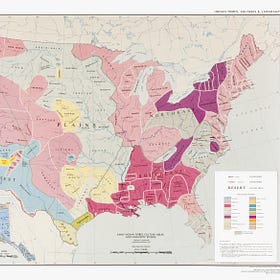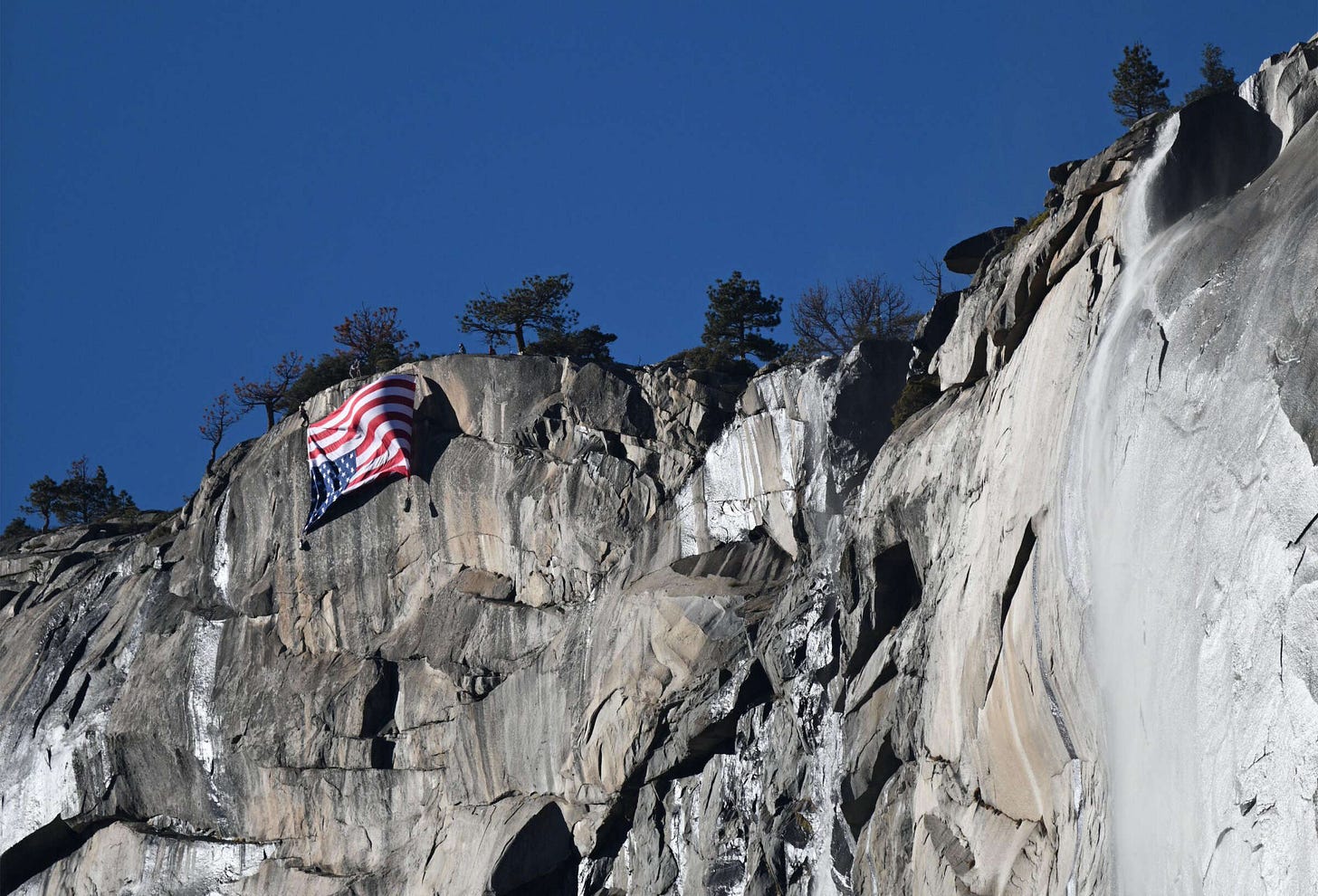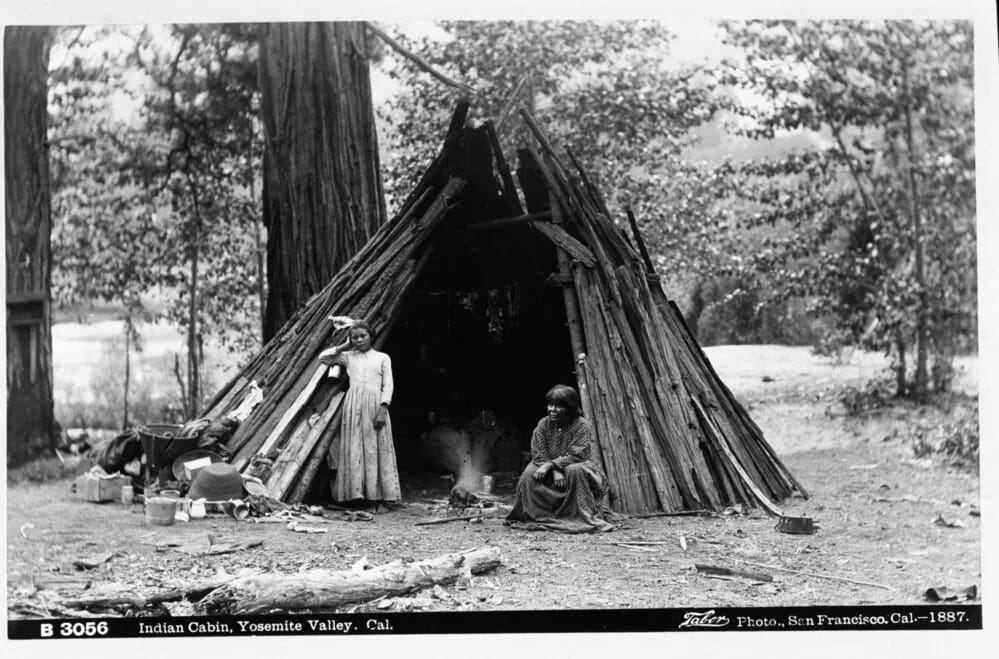What's Missing in Conversations About Federal Land Management Job Loss
We need to allow nuance, and include all voices. Now, more than ever.
Please forgive any typos or grammatical errors in this post. I am prioritizing actually getting my words out there rather than deep editing– but everything here has been fact-checked thoroughly. Much of what I write about below is explored in detail in my forthcoming book, HOTSHOT. If you’re interested in reading it, please pre-order the book!
In 1585, a British scientist named Thomas Hariot accompanied Sir Richard Grenville by ship, from Britain, to what is now known as South Carolina. They came by ship.
Britain was running out of resources, and resources, or what they called “commodities,” was what they wanted.
I invite you to read my deeply researched piece about this here:
Killers of the Flower Moon and Other Misconceptions
It’s been a while! But here we are, and Wilderness is still here! The newsletter, I mean. I’ll be sending out a short post later this week to share this newsletter’s evolving ethos, but for now here is some scholarly work I’ve been doing with archival materials.
Hariot, along with an accompanying artist, created a document called “A briefe and true report of the new found land of Virginia.”
Notice the words “new found.”
The land was not newly found, although this was their first time encountering the land. The Algonquin people lived there. Without their help, Hariot, Grenville, and the crew would not have survived the winter.
Hariot documented this journey in detail and revised it in order to appeal to wealthy British citizens wanting to move to this “new” land. He listed the commodities, including minerals and other “resources.” He described the people and their culture, taking care to smooth any sharp edges that would have repelled would-be colonizers.
He visited village after village, remarking on how these new friends of his seemed to sicken and die in his wake. He learned their language, while simultaneously dehumanizing them and literally killing them through disease exposure. Then he wondered why they grew increasingly hostile and withdrawn.
This is one of many (many) instances of Europeans arriving in the “new” world, documenting its commodities and cultures, and then convincing others to move abroad despite the dangers and discomforts. Despite the many people who already lived there.
The Doctrine of Discovery stated that the New World would belong to the first European country whose people filled the borders they created.
It already had borders– towns, villages, and lands occupied and tended by diverse peoples. But they did not honor those borders, nor did they treat the people as human, though they did initially see them as charity cases of a sort, which is simply another kind of dehumanization.
As competition between European powers ramped up, Indigenous people throughout the United States fought for their rights and lands. The fought hard, and despite enslavement, murder by hand or gun or sickness, residential schools, family separation, and genocide– Indigenous people survived. And they are still here today. They are strong, and they are present.
But their voices are continuously sidelined in cultural conversations, like the one happening now.
In early February Elon Musk sent out the infamous “fork in the road” email to federal workers.
Since then, there’s been an absolute gutting of federal agencies, with tens of thousands of workers being fired and laid-off, many of them with poor performance reviews that do not reflect real-life data.
I worked for the Forest Service and Park Service for a total of four years. As a firefighter, I killed my body for our government.
Many of these employees are National Park Service and U.S. Forest Service employees. Note that the “probationary” terms here are very complicated. A few things:
Many employees of the USFS and Park Service are, by definition, probationary– even permanent and long-time employees. This is because a large number of these jobs operate in the spring, summer, and fall, with a few months off in the winter, to accomodate any extra work an employee may take on during fire season.
The Biden administration, in response to a federal wildland firefighter shortage, hired thousands of new employees in 2024. All of them were still in their “probationary” period– they were essential for fighting summer wildfires, as well as conducting land maintenance that can reduce summer wildfire danger. These employees are now gone, leaving the entire country vulnerable to wildfires.
The majority of USFS and NPS employees get paid less than $50,000 a year.
A bad fire season can equal billions of dollars in government spending. Without employees conducting essential maintenance in the off-season, or available to work as firefighters during fire season, this price tag will rise, and these decisions could result in catastrophic damage to already vulnerable communities.
Many of the employees who were fired have worked for their respective agencies for many years, or even decades. Some long-term employees were counted as “probationary” because they were working in different districts or transitioning between job locations.
Firing probationary (newer) employees is not a wise way to cull a workforce. These are smart, specialized, early-career recruits. Many of them were scouted because of their exceptional skills and abilities.
Employees were given no notice of their firings. They have families, children, and lives to support. They are left with no recourse and no income. What Musk has done is patently illegal. It’s also unethical and unconsciable , considering that the “bad performance” noted in the firing letter was not based on any actual performance reviews.
Many federal employees have not been able to acces their actual performance reviews since the firings occured, because the portal is unstable. This is likely a product of DOGE staffers f*cking with the system.
Let’s be clear: The reason these firings occurred is because Musk’s “fork in the road” attempt FAILED. It failed. The number of people who took that option is essentially equivalent to the yearly federal retirement rate.
This is because many (most) federal workers have deliberately chosen their jobs. Not because they want to be rich, or laze around, but because they love the work. So Musk took harsher measures. The Trump administration, in general, is trying to disrupt the lives of the remaining federal workers in ways that equal harassment. Musk did this at Twitter, when he took over. He wants federal workers to be publicly lambasted. Miserable.
Elon Musk and Donald Trump are bullies. It’s that simple. And it’s not okay.
While these firings are catastrophic, and we need to advocate for employee reinstatement, it’s also important to understand what’s being overlooked.
The photo above is from Yosemite National Park, where workers flew an upside-down American flag, signaling distress.
Yosemite National Park.
A beautiful, sacred place.
Without the conservationists who saved Yosemite, the land wouldn’t exist in its preserved state.
But the men who preserved this land are kin to the one’s who threatened it– neither of them had a right to any sort of land ownership.
Was it necessary to protect the land? Yes.
Was the land also stolen? Yes.
Since time immemorial, Indigenous people (the Miwok, Mono, and Paiute) cared for the Yosemite Valley. In scientific terms, they inhabited the land for around 10,000 years, but according to them they have always lived there.
I believe them.
Like the stories of colonization, when ship after ship arrived and men relied on the help of Native Americans only to turn on them, the story of Yosemite is similar to the stories of many of our country’s national parks and national forests.
National parks were preserved as “vignettes”, while national forests and land under the jurisdiction of the Burea of Land Management was (and still is, especially with the BLM) was slotted for resource management, like logging and mining. The U.S. Army occupied Yellowstone, Yosemite, and other national parks and forests, violently stealing the land from tribes and disrupting millenia of ecological symbiosis. Renaming sacred places. Shuttling their inhabitants onto reservations with respect to tribal affiliation or histories. The lands, of course, held important “commodities.” Sometimes tribal members were paid for their land, only for the government to turn around and sell it off at a higher price to someone else.
While it’s important that we fight for civil service jobs in land management, we also need to acknowledge that Indigenous communities throughout the United States have been fighting for access and rights to their cultural heritage. These lands are their cultural heritage.
The lands do not belong to anyone. The system of ownership through which most Americans see everything is not native to the United States. It’s a European ideal. One that can, at times, be invisible. Assumed to be true. A default.
In a perfect world, no one would own land. But we do not live in a perfect world. In a fair world, Indigenous people throughout the U.S. would not have to remind us that Yosemite was their home before it became a National Park. That they have a right to their lands.
When Park Service employees fly an upside-down American flag on El Capitan– a sacred site that now bears a Spanish name rather than Tu-to-kan-ula (a phonetic rendering of its Miwok name, meaning “Rock Chief”)– they express a sort of ownership over a land that should not be owned.
Some could say that now is the wrong time to have this conversation. That we should focus on reinstating people’s jobs. But I think now is the right time. If we are fighting for change, why not fight for fundamental change? Why not advocate for the inclusion of Indigenous voices in this conversation?
Tell me what you think.
Please feel free to share any additional information, resources, and opinions. If you’re a government employee that was fired, feel free to contact me and share your experience and thoughts. I’m interested in hearing from you.







I am a non-binary person working in wildfire right now and I have been waiting to read something like this for a while. I have been so frustrated that even the most progressive people in fire are unwilling to name the real problems behind all of our frustrations with land management, that is, that it is not our land to manage. People are slowly willing to acknowledge that white colonial practices of forcing an end to cultural burning caused a lot of the fuel loading problems we face now, but somehow it always stops short of anything even remotely close to “land back.”
There’s also the necessity, I think, to engage with the concepts of conservation and preservation as they’re used in our conversations about public lands and how they embody an anthropocentric perception of nature that encourages ownership and domination.